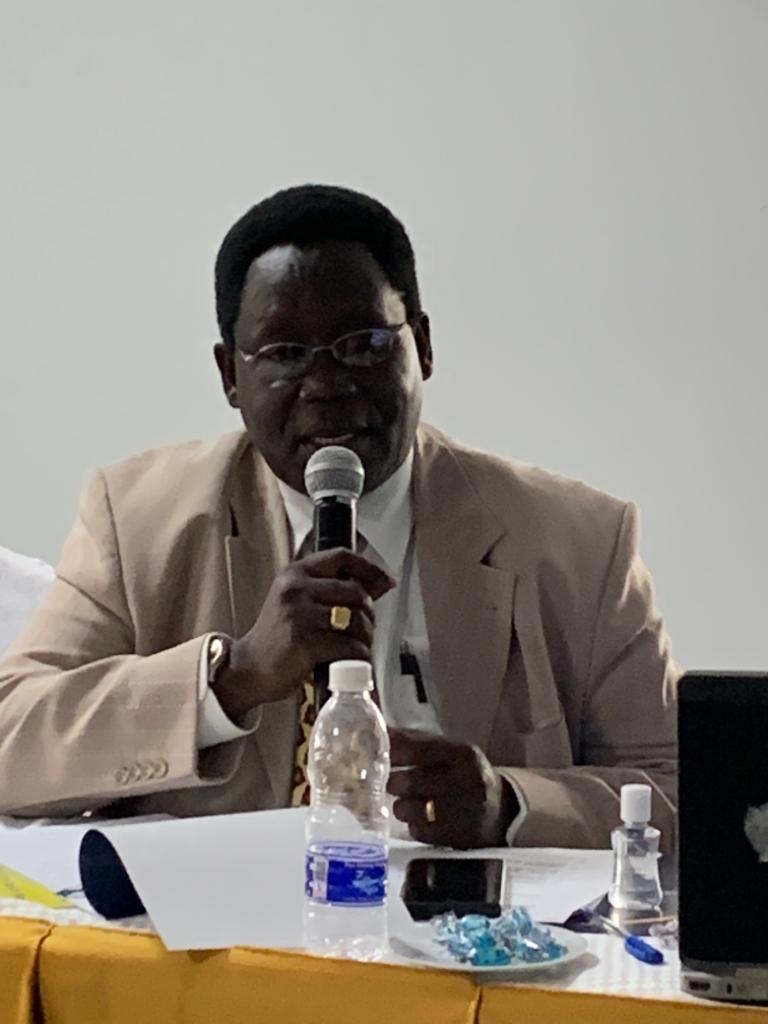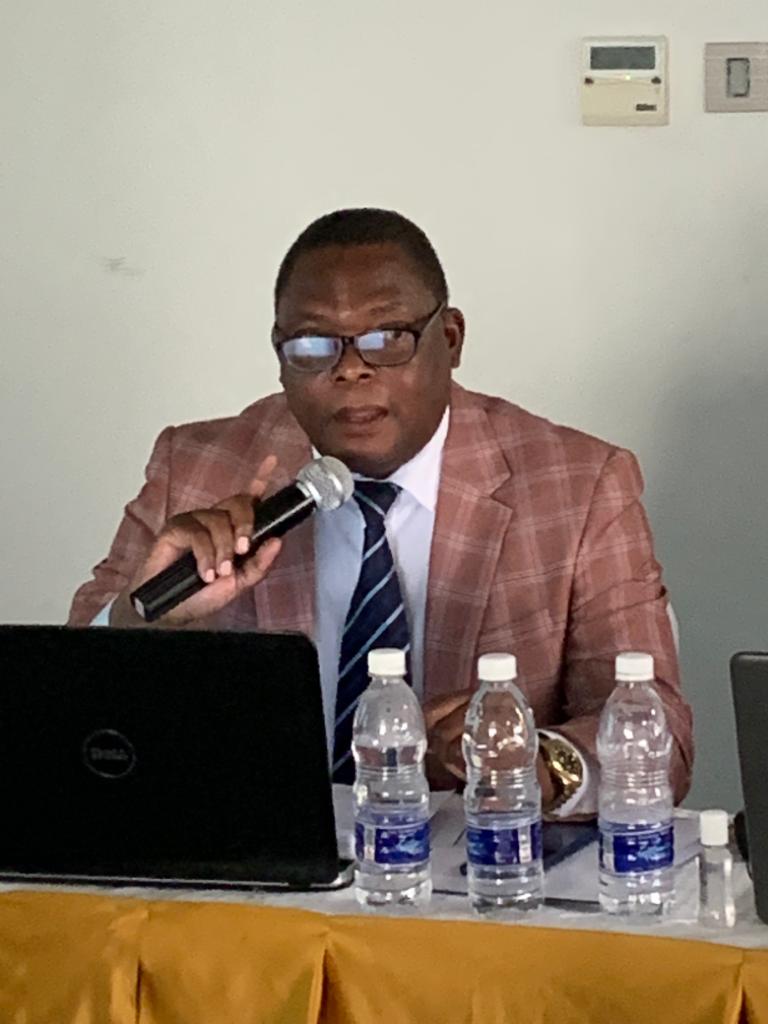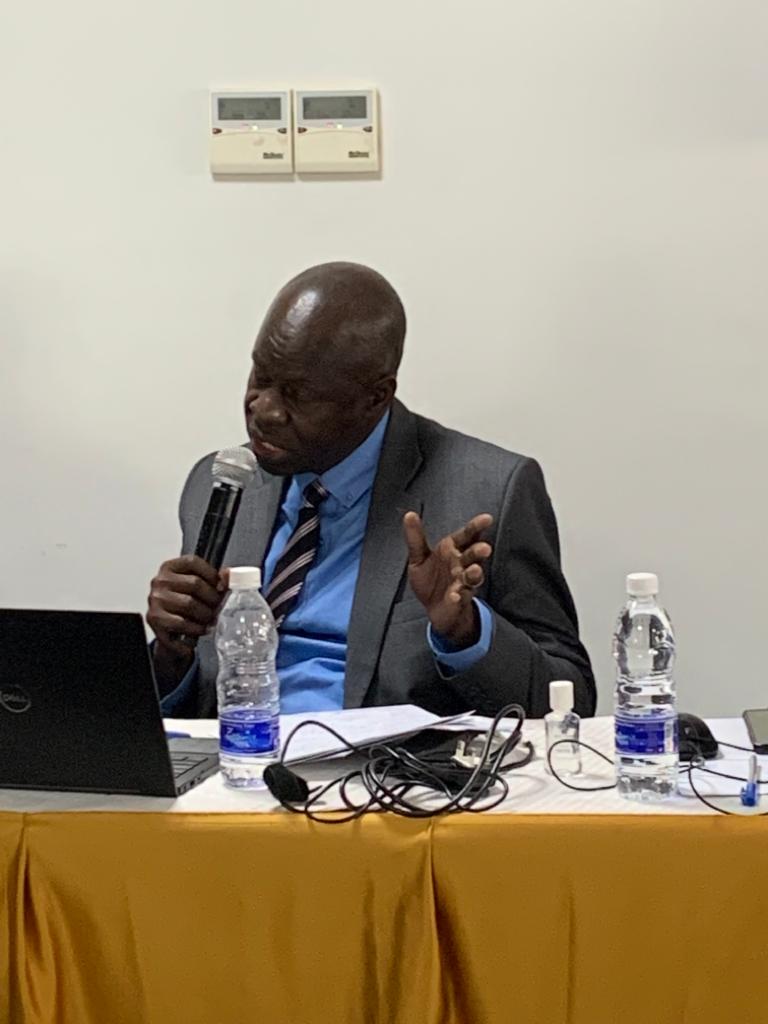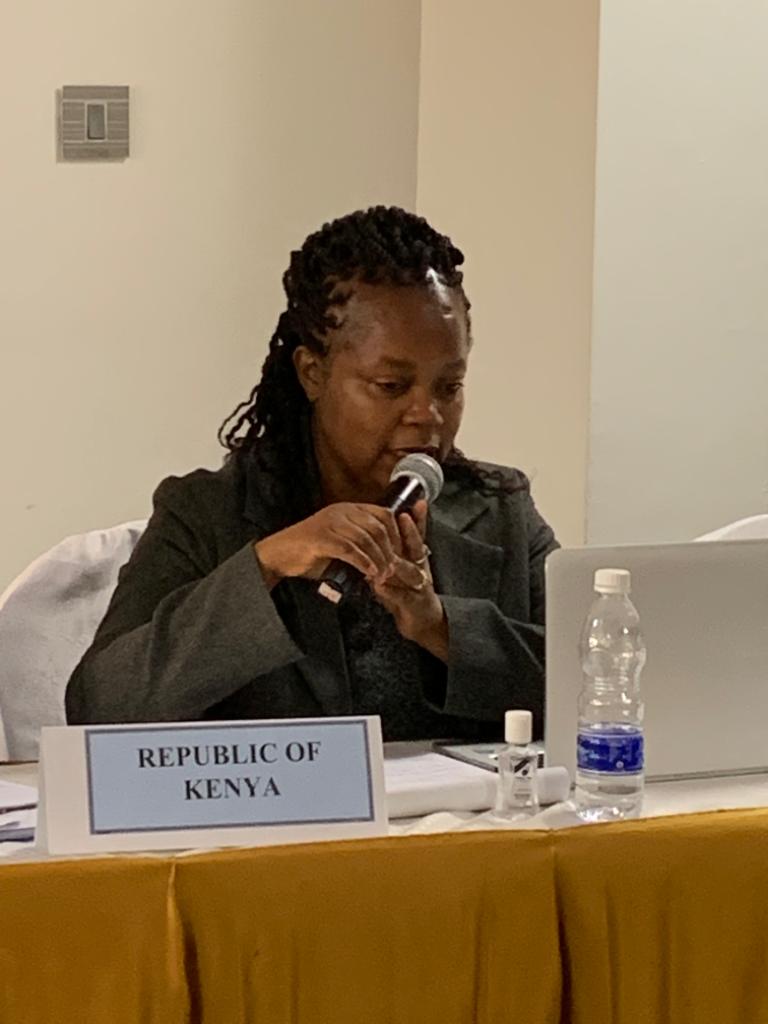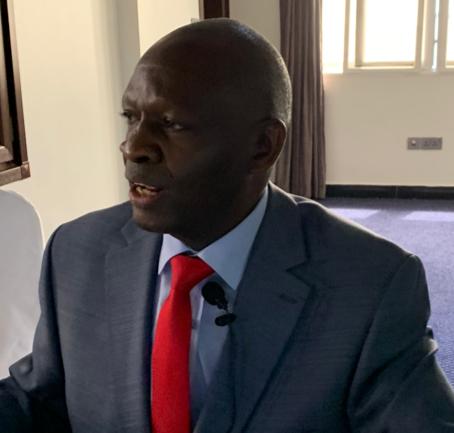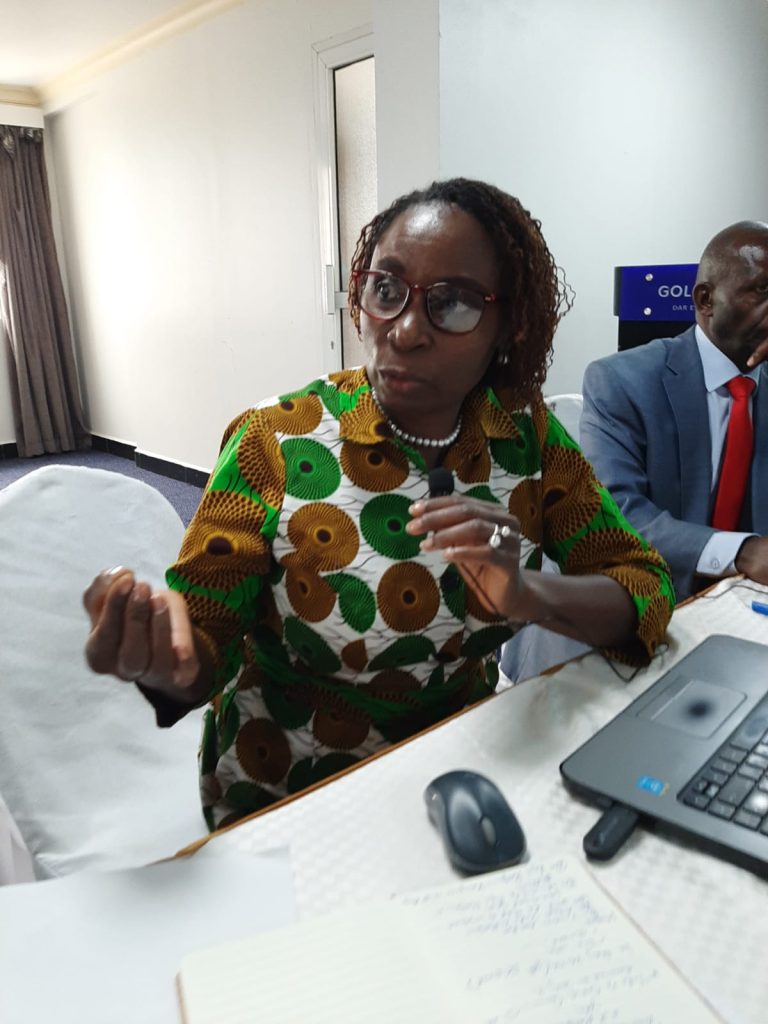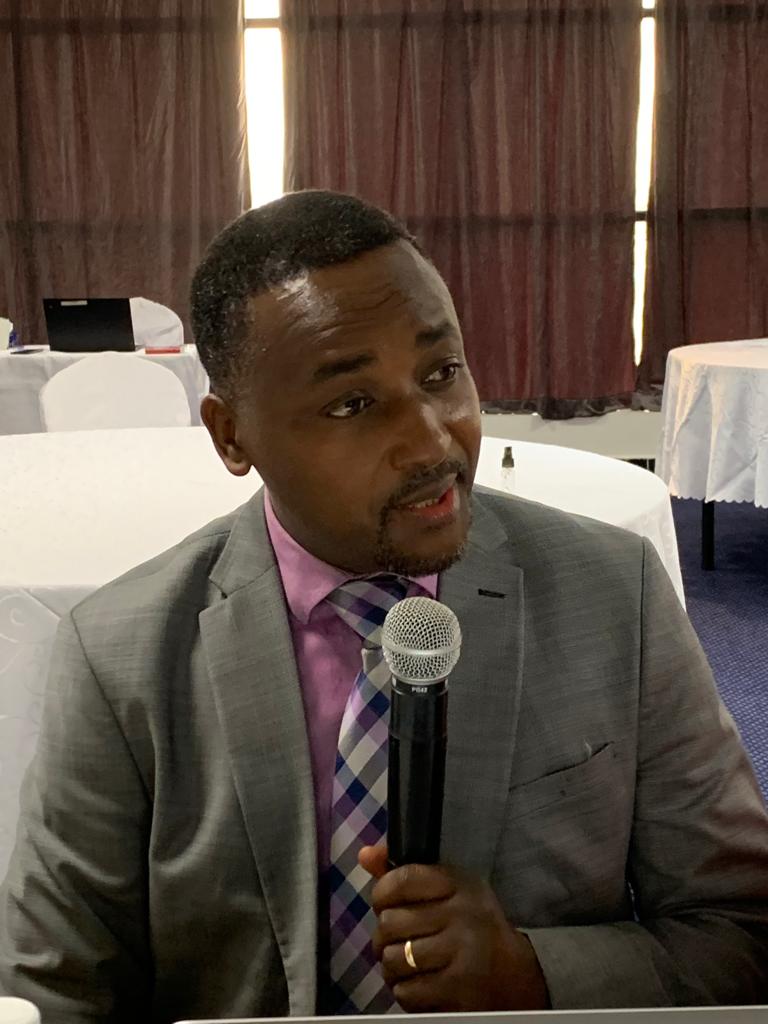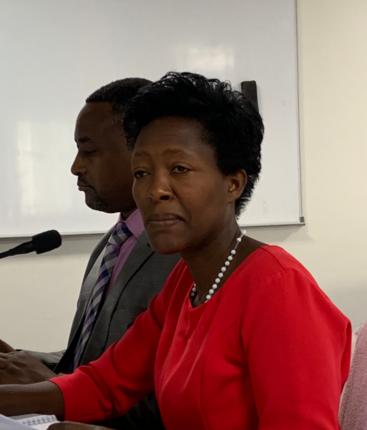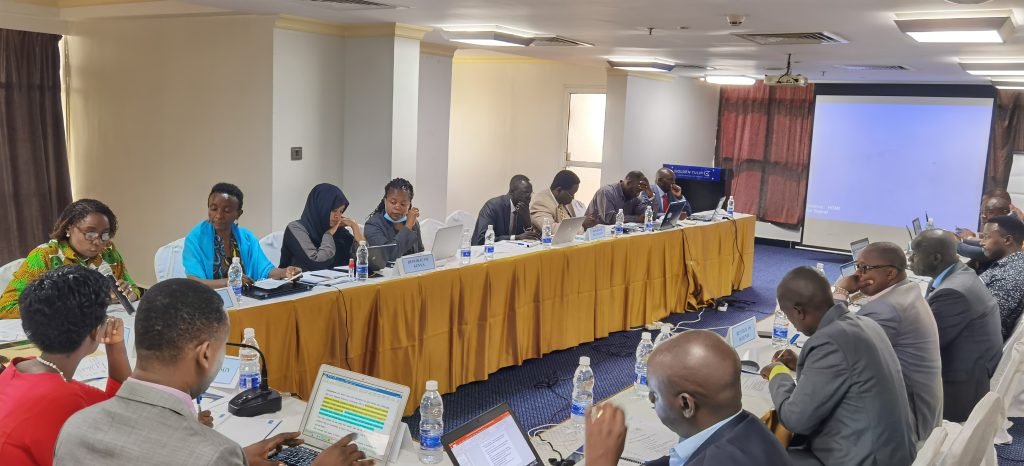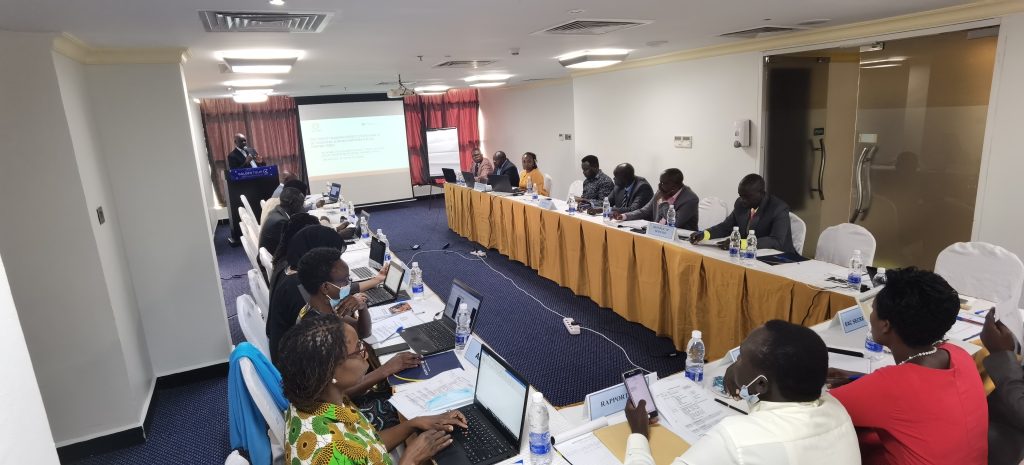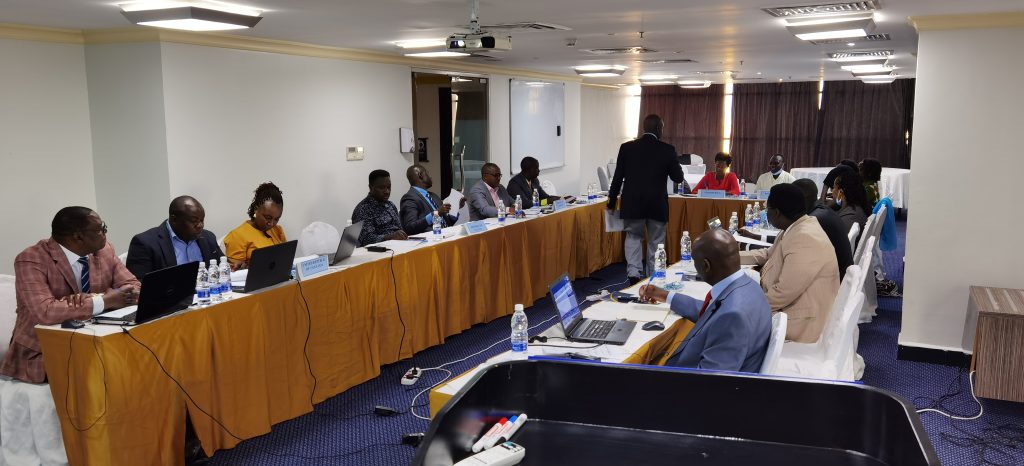Author: saront
EAC Secretariat Capacity Enhanced to Address Land Governance Challenges
The African Land Policy Centre (ALPC) has enhanced the capacity of senior staff of the East African Community (EAC) Secretariat to facilitate the integration of land governance issues in programmes, especially those of the productive sector. The capacity-building workshop on implementing the AU Declaration on Land was held on 16 -17 August 2022, in Kampala, Uganda, under the auspices of a joint ALPC-EAC project which was endorsed by the EAC Council of Ministers of Environment and Natural Resources Management.
Emphasising the cross-cutting nature of land, ALPC Coordinator, Ms Joan Kagwanja, applauded the EAC secretariat’s participation at the senior level in the workshop, noting that capacities gained to integrate land governance issues in programmes will significantly advance EAC interventions in support of achieving objectives related to agriculture and food security; environment and natural resources; tourism and wildlife management; energy, infrastructural and industrial development; gender and women empowerment, among others. She further commended recent efforts and commitment to engage with the Partner States and establish a steering committee that will oversee the implementation of a road map, the first activity of which is the operationalisation of a platform for the exchange of knowledge and best practices among partner states. This is what is envisaged in the AU Declaration on Land.
This workshop draws on a recently validated capacity assessment study report conducted with the technical support of ALPC, which identified the need to enhance the capacity of the EAC Secretariat to better address land issues within EAC programmes. The assessment also noted a gap in knowledge platforms that would facilitate the exchange of best practices among Partner States, and identify emerging issues in order to design frameworks/mechanisms to address land issues, especially those that are transboundary in nature. The assessment also emphasised the role of the Network of Excellence on Land Governance in Africa in bridging these gaps. Capacity building modules touched on how to address land governance issues such as securing land rights for all land users, promoting responsible land based investments, preventing and addressing land and ethnic-based conflicts, improving women’s access to land/securing their land rights, and the central role of land use planning, effective land administration and information systems, the role of communication, among others.
EAC Premiers its Regional Platform on Land
Partner States of the East Africa Community (EAC) are resolute in ensuring the implementation of the African Union (AU) Declaration on land within their respective countries. The resolution follows the sharing of best practices by the EAC Partner States during the first Regional Platform meeting held on 17-18 August 2022 in Kampala, Uganda. The platform provides EAC Partner States with an opportunity to share country lessons and best practices in land policy formulation, implementation and review to inform land reform processes in their respective countries.
“The Regional Platform is the first of its kind in the EAC and is expected to generate discussions and knowledge which will be helpful to all EAC Partner Statesâ€, explains the EAC Secretariat Director of Productive Services Jean Baptiste Havugimana. The forum discussions, he went on to explain, help to promote sustainable development and the rational utilisation of the region’s natural resources.
Joan Kagwanja, the Coordinator of the African Land Policy Centre at the Economic Commission for Africa, applauded the EAC for putting in place a Regional Steering Committee and establishing the Regional Platform, which provides a sustainable mechanism for bringing the Partner States together for the periodic sharing of lessons and dissemination of best practices in land policy formulation and implementation. She noted that land governance issues are cross-cutting within the region and reiterated the need to improve land governance in East Africa to achieve the EAC Vision 2050.
To facilitate the first Regional Platform ALPC provided technical support for a regional assessment to determine the status of land policy development in EAC Partner States. The assessment identified priority and emerging issues, along with the best practices in each of the Partner States, identifying the need for the establishment of a regional platform to facilitate the sharing of lessons and best practices. The participants appreciate the role of the Network of Excellence on Land Governance in Africa, especially the achievement of the Eastern Africa node and its universities in the land policy processes in Partner States; and the potential contribution of the network to the Regional Platform.
Government representatives from Tanzania, South Sudan, Rwanda, Uganda, Kenya and Burundi shared best practices at the forum, including the inclusion of the land rights of women, youth and other vulnerable groups in the land policies, laws and practices of Partner States. The forum called for the EAC secretariat, with the support of ALPC, to enhance capacity building and resource mobilisation for land policy formulation, implementation and review within EAC Partner States.
NOTE TO EDITORS:
The African Land Policy Centre (ALPC) is a joint programme of the tripartite consortium consisting of the African Union Commission (AUC), United Nations Economic Commission for Africa (ECA) and the African Development Bank (AfDB). Its purpose is to lead and coordinate the implementation of the AU Agenda on Land
Land Experts Validates Initiative to Advance the NELGA Project
Stakeholders in land governance have endorsed the process of establishing a five-year strategic plan (2023–2027) for the Network of Excellence on Land Governance in Africa (NELGA). The validation session on Zoom on August 11th, 2022, highlighted the road map for implementing the strategic plan to drive NELGA’s operations and ensure sustainability.
Joan Kagwanja, the African Land Policy Centre (ALPC) coordinator, UNECA, noted that NELGA’s accomplishments are indeed significant. We must build on these accomplishments and ensure clarity in administrative and programmatic actions within the network. She encouraged stakeholders to continue to support the expert team in developing the NELGA road map in developing systems that intersect and influence land policy formulation and implementation.
The gaps and challenges identified in terms of the strategic destination of NELGA will be addressed in the NELGA Strategy & Business Plan 2023- 2027, Communication and Visibility Strategy, Monitoring & Evaluation Framework 2023-2027 & Resource mobilisation strategy, which are set to be validated in 2022. Stakeholders at the meeting include NELGA coordinators, the ALPC, GIZ African Union Strengthening Advisory Capacity for Land Governance in Africa (SLGA) Program, and other land governance experts.
East Africa Establish Regional Steering Committee on AU Land Agenda
Partner States (PS) from the East Africa region established a Regional Steering Committee (RSC) at the end of a three-day meeting of the Regional Technical Working Group (TWG) on the Terrestrial Ecosystem on July 28. The RSC will oversee and coordinate the implementation of the AU Declaration on land and provide policy and technical guidance to the PS and East Africa Community (EAC) Secretariat on the overall implementation of the AU land agenda. While endorsing the terms of reference for the RSC, Members at the meeting applauded the milestone as an important step and timely for land policy development, review and implementation, especially as some PS are yet to enact comprehensive land policies. The RSC will support technical working groups that will oversee implementation efforts in the region to address capacities and best practices to enhance land reforms in the region.
The African Land Policy Centre (ALPC), charged with the custodian role on the AU land agenda, provided technical support in setting up the RSC in coordination with the EAC secretariat. Joan Kagwanja, the ALPC Coordinator, also commended the TWG’s commitment to the ECA-EAC partnership and the establishment of a multi-sectoral coordination platform at national and regional levels for the PS to share experience, and information, lesson learned and best practices in land policy formulation and implementation.
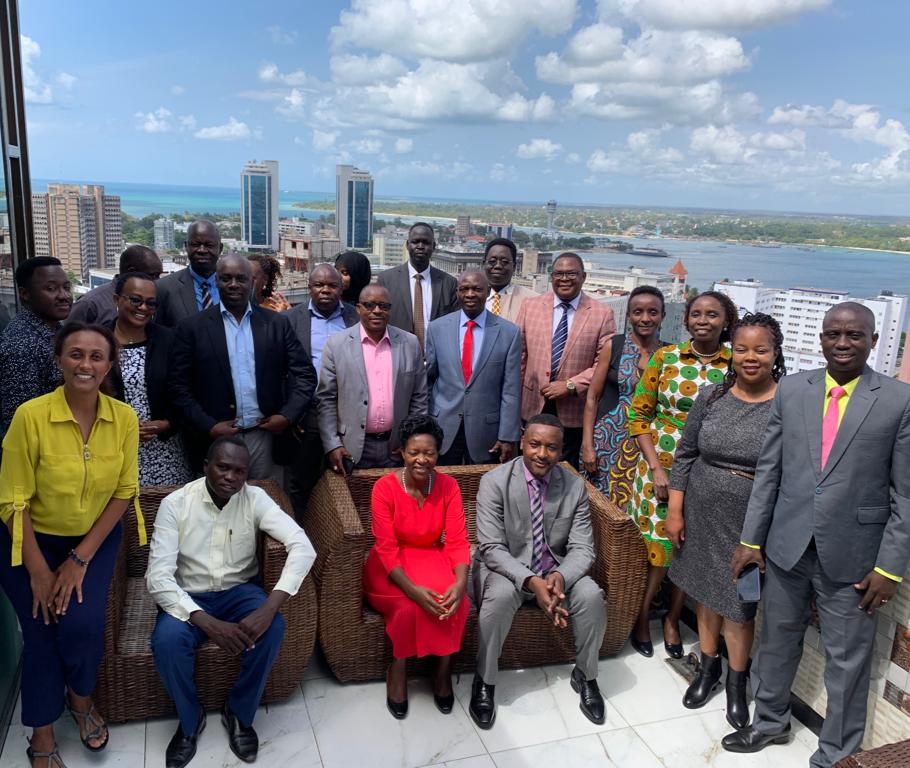
Jean Baptiste Havugimana, Director of Productive Sectors (DPS), EAC Secretariat, stressed the need for Partner States to cooperate in implementing the AU land agenda. He shared insights on the progress made in the EAC region on land governance while stressing the importance of operationalizing the regional land platform by the end of 2022 as it is a crucial directive by the 8th Sectoral Council on Environment and Natural Resources Management.
On capacity development, the PS called on the EAC Secretariat and ALPC to build the capacity of the PS on the AU declaration. They also requested the full engagement of existing Centers of Excellence (CoE) in knowledge sharing that forms the basis for policy review and development, especially as the Centers of Excellence have sectoral knowledge. This will ensure mutual learning and understanding of expectations and support their policies’ alignment with the Framework and Guidelines on Land Policy in Africa.
Moving forward, the PS agreed to hold the first meeting for the RSC in August to discuss the capacity development road map and the coordination role of the RSC to assume leadership.
Partner States Experts’, drawn from ministries and institutions responsible for EAC affairs, land policies development, land use planning and administration, and environment and natural resources management from Tanzania, Kenya, South Sudan, Uganda and Rwanda, attended the meeting.
NELGA Knowledge Exchange – Understanding the Guidelines for the Development of Curricula on Land Governance in Africa
The African Land Policy Centre (ALPC) is a joint programme of the African Union Commission (AUC), the African Development Bank (AfDB) and the United Nations Economic Commission for Africa (ECA). The ALPC is leading the implementation of the AU Declaration on Land Issues and Challenges in Africa, which is anchored on the Framework and Guidelines on land policy in Africa (F&G.) It facilitates stakeholders in the land sector to achieve the continental aspirations that ‘equitable access to land, secure land tenure rights, gender equity, improved governance in the land sector and reduction of land-related conflicts’, are fundamental aspirations of the African people, as together, they pave the way to secure livelihoods and prosperity.
Over the last ten years, the ALPC remained committed to facilitating improved land policy terrain in Africa by working with partners to develop guidelines and frameworks to address emerging land-related challenges for the continent’s socio-economic growth. Through research, advocacy, capacity development, technical support and advisory services among others, the ALPC supports the AU Member states in meeting their development priority areas as captured in the Agenda 2063 and SDGs.
In meeting its mandate, the ALPC, in partnership with the Member States, CSOs, Academia and other stakeholders, has developed several tools at the continental level. Endorsed by the AU, these tools in the form of guidelines, frameworks and principles provide the necessary benchmark for land governance to thrive in Africa. To ensure these tools reach the intended users, the ALPC now plans to hold several virtual webinars under its NELGA Exchange Platform (NEX) to share the contents and experiences and progress in applying these tools. Among the tools lined up for dissemination are the AU-endorsed guidelines, including:
- Guidelines for the Development of Curricula on Land Governance in Africa
- Guidelines on Land Ethnicity and Conflict in Africa
- Guiding Principles on Large Scale Land-based Investments in Africa
Guidelines for the Development of Curricula on Land Governance in Africa
This edition of the next NELGA Exchange Platform (NEX) will focus on the Guidelines for the Development of Curricula on Land Governance in Africa. Simultaneously, the other Guidelines will be covered in subsequent Webinars.
The Guidelines for Curricula Development on Land Governance in Africa are meant to facilitate the development and review of curricula to ensure that university graduates and land professionals are better skilled in addressing Africa’s land governance challenges. In particular, it is envisaged that the guidelines will contribute to land professionals being better trained to understand traditional land governance systems through which over 80% of Africa’s land is managed and the political dimensions of land governance that influence Africa’s ability to find solutions to underlying and emerging land governance issues. It is envisaged that the guidelines will offer insights for curricula that further equip students with knowledge of these issues as well as others outlined in the Guidelines.
The Webinar
The webinar is in response to Universities’, Institutions of Higher Learning and other stakeholders’ request to the ALPC to expound on the content of these guidelines and how best they could be mainstreamed in the curricula/research on land and related fields in Africa. The Webinar is open to all stakeholders interested in capacity development in the African land sector, particularly the researchers and scholars within universities/research institutions.
This edition of the NEX aims to provide an overview of the Curricula Guidelines and share experiences/progress in implementing similar actions.
Jimmy’s Success Story- NELGA Alumni
“Attending the NELGA course on the Political Economy of Land Governance in Africa has shaped my career” – Jimmy Ochom, a land rights advocate, shared his experience in the NELGA program.
Three significant actions have influenced me in my career.
As a child who grew up in Ntinda, Uganda, my career path was first influenced by my secondary school, Busoga College, which taught me to live independently and think outside the box for innovative solutions to the country’s problems. This is solely attributed to the school culture and enabling environment it provides.
The second influence was my father, the late David Onyoin Okalebo. He believed that education was the key to my success. By the time he died, he was the CEO of the Teso Private Sector Foundation. He took his time to teach me how NGOs operate. From that background, when I realised NGOs could support my human rights interests, I ensured that for every internship and clerkship, it was from organisations that supported my areas of interest.
The third influence was my passion for land rights. My first job as a Legal Officer at the Uganda Land Alliance shaped my career; the organisation advocated for the realisation of land rights for the vulnerable. I loved what I did. I saw the impact of my work through access to land justice in beneficiaries’ lives. This passion led me to explore opportunities to foster land rights, including attaining a Master’s in Laws (LLM-Laws).
These three influences impacted my knowledge and opened doors for me, including being selected for the 2018 NELGA short Course on the Political Economy of Land Governance in Africa organised by the Institute for Poverty, Land and Agrarian Studies. This was a turning point in my career as a land rights expert. The course enabled me to understand several things that drive land governance. I learned the intersection between land rights, climate change, food systems, agriculture, legal empowerment, and politics and how these influence the growth of countries’ economies. I have used and grown this knowledge, and I have taken younger lawyers whom I am also empowering and steering their careers toward land governance. Attending the NELGA course on the Political Economy of Land Governance in Africa has shaped my career. It has exposed me to all regional, national, and global platforms where I have been able to champion the fight for land rights in my country and globally. I could appreciate the intersection between law, legal empowerment, land rights, food security, climate justice, and agriculture and how these challenges need to be understood to support the growth of economies. The course gave me a grasp on the analysis of land policies, food systems policies, agriculture policies, legal empowerment policies, etc.
The training has influenced my work. I do advocacy and influencing, especially in government, and my learnings have made me more confident in the land space.
The training boosted my confidence that I remain on the right path on land rights. Many people always associate lawyers with private and corporate spaces with little to no support for community rights for something as simple as simplifying legal interpretations for the community. I currently provide legal interpretation for laws associated with communal land rights and equip citizens with knowledge about land laws and policies, to stand up for any injustices, especially for women, youth and the vulnerable.
NELGA, DAAD Announce Second Summer School on Land Governance in Ghana
In February 2019, NELGA held its scholarship holders’ first summer school and research development workshop in Ghana. Hosted by NELGA Anglophone West Africa (AWA) node under Kwame Nkrumah University of Science and Technology (KNUST), the workshop sets the stage for NELGADAAD-scholarship holders to meet experts in land governance, learn and share ideas and network among NELGA scholars and trainers. The first edition of the summer school provided the platform for in-house training on different tools for research data collection and analysis.
Following the success of the 2019 edition, NELGA AWA will organize a second summer school in 2022 to provide further assistance to scholarship holders in personal branding, mentorship and entrepreneurship, which are essential for preparing scholarship holders for the job market. The aim of the summer school is also to allow the NELGA-DAAD scholarship holders to present and discuss their research work, methodological design and preliminary results in a constructive atmosphere. Candidates will receive feedback from external experts, fellow candidates and supervisors. KNUST will compile the experiences of alumni from which current scholarship holders can learn and benefit. At the end of the summer school, a platform will be created and sustained where fellows and alumni will interact and receive regular information and updates on land governance issues, job vacancies, scholarship opportunities for further training and other career development prospects.
Against these backgrounds, the summer school will discuss different concepts, theories and epistemological approaches with supervisors, external experts and researchers; Introduce scholars to time management; Introduce scholars to the art of writing successful research thesis and getting published; Prepare scholarship holders for the job market; and Foster collaboration and networking among scholars, KNUST, and alumni.
Click here to view the course content, trainers, schedule, assessment and other information.
For more information, contact: Patrick.Opoku@giz.de
NELGA DAAD Announces Second Summer School on Land Governance in Ghana
In February 2019, NELGA held its scholarship holders’ first summer school and research development workshop in Ghana. Hosted by the NELGA Anglophone West Africa (AWA) node (Kwame Nkrumah University of Science and Technology (KNUST)), the workshop sets the stage for NELGA DAAD-scholarship holders to meet experts in land governance, learn and share ideas and network with NELGA scholars and trainers. This first edition of the summer school provided a platform for in-house training on different tools for research data collection and analysis.
Following the success of the 2019 edition, NELGA AWA will organize a second summer school in 2022 to provide further assistance to scholarship holders in personal branding, mentorship and entrepreneurship, which are essential for preparing scholarship holders for the job market. The aim of the summer school is also to allow the NELGA-DAAD scholarship holders to present and discuss their research work, methodological design and preliminary results in a constructive atmosphere. Candidates will receive feedback from external experts, fellow candidates and supervisors. KNUST will compile the experiences of alumni from which current scholarship holders can learn and benefit. At the end of the summer school, a platform will be created and sustained where fellows and alumni will interact and receive regular information and updates on land governance issues, job vacancies, scholarship opportunities for further training and other career development prospects.
Against these backgrounds, the summer school will discuss different concepts, theories and epistemological approaches with supervisors, external experts and researchers; Introduce scholars to time management; Introduce scholars to the art of writing successful research thesis and getting published; Prepare scholarship holders for the job market; and Foster collaboration and networking among scholars, KNUST, and alumni.
Click here to view the course content, trainers, schedule, assessment and other information.
For more information, contact: Patrick.Opoku@giz.de
Academia-Industry in Land Governance Forum: Showcasing Opportunities to Bridge Research and Capacity Gaps to Achieve Agenda 2063
The first day of the Network of Excellence on Land Governance in Africa (NELGA) North Africa series of workshops and conferences on The Academia-Industry collaboration in land governance: an emerging opportunity from profit-making to innovation which took place on June 27 in Rabat, Morocco, concluded with a plenary session on research-industry best practices in strengthening academia-industry relationships while meeting industry needs for Africa’s development.
The goal of the session was to discuss, share and disseminate the achieved knowledge for NELGA North Africa and contribute to the capacity development of partners in various domains that have direct linkage with land governance, land policies, and géoinformation technologies. It also includes how this knowledge can make its way into policy and land market spaces. All speakers agreed that land governance efforts are key to achieving the SDGs and African Union Agenda 2063 as land is linked to most development interventions and the academic support needs to be scaled up if sustainable development is to be achieved.
“A well-functioning land market together with high security of land ownership will lead to stronger economic development for Morocco, the North Africa region, and the continent†explains Prof Abdelaziz El Hraiki, Director of IAV Hassan II. He emphasised that essential collaboration with academia can address serious challenges thrown up by land tenure systems which can guarantee sustainable land resources management. The academia provides research insights which are captured in comprehensive frameworks. These frameworks are essential for sustainable development as they focus on best practices and research achievement which can be scaled and adapted to meet the unique needs of AU member states.
Joan Kagwanja, the Chief of UNECA’s African Land Policy Centre (ALPC), agreed with Prof El Hraiki and urged greater collaboration between academia and industry to bridge capacity, research and advisory gaps. The academia trains the policymakers, land professionals, decision-making authorities and other actors. It provides the necessary analysis that forms the basis of the evidence used to develop legal and institutional frameworks. “We identify a real gap between industry and the university. At ALPC, one of the ways we work to close the gaps is by looking at the land curricula across the continent. We have developed an AU endorsed guideline to close these gaps,†explains Kagwanja in addressing best practices for bridging knowledge gaps. She calls for better integration of research efforts within existing land development mechanisms.
In addition to highlighting the role of research in supporting the development of legal frameworks, Kagwanja spoke at length about the creation of the ALPC and the role of the African Union Commission and Africa Development Bank in meeting the AU Land Agenda. The AU Agenda 2063 and the SDG targets call for sustainable land governance. Without an enabling land environment, the continent will not be able to meet its development targets, especially around poverty, zero hunger, gender equity, climate and others, which affect the way resources are managed. Land governance remains a political, economic, health, conflict and development challenge that impacts other economic growth areas. Addressing land governance promotes sustainable development for the continent, she concluded.
NELGA is a program of the ALPC. The ALPC, created through a tripartite partnership of the UNECA, AUC and AFDB is involved in many projects that demonstrate the relationship between academia and research with policy and market spaces, including through NELGA. One of such spaces is the bi-annual Conference on Land Policy in Africa which brings together land stakeholders from across Africa and the globe to discuss new trends, opportunities and resolutions toward sustainable land governance and development in Africa.
Central Africa Validates Research on Cameroon, Chad, CAR Cross-border Conflict
On 28 June 2022, NELGA Central Africa brought together experts on land issues from several Central African countries for a validation workshop on its research on evaluating the triggers and solutions to cross-border conflicts between Cameroon, Chad and CAR through the land lens.
These experts met to enrich the project document on land conflicts between farmers and herders on the three borders of Cameroon, Chad and CAR for validation. The workshop was attended by 20 people who made suggestions on different parts of the document through plenary and group discussions. Professor Tchawa Paul, the coordinator of NELGA CA, who took part in the workshop, hoped that donors interested in the issue would be open to discussions with a view to funding the effective implementation of this project.
In 2021, NELGA Central Africa embarked on baseline research to find lasting solutions to conflicts between farmers and herders along the Cameroon, Chad and CAR borders.
For years, conflicts between farmers and herders in the Sahelian regions have occurred repeatedly. Farmers and herders need spaces that offer appropriate resources to expand their agricultural activities but with the contribution of climate change resources are dwindling and conflicts ensue from the struggle over limited resources which has a huge impact on women who are the primary users of land in rural-border areas.
Although there are innovative practices in finding peaceful resolutions of land conflicts without recourse to the laws, however, these peace terms do not stand the test of time and end up with the destruction of property, loss of life and internally displaced persons.
The meeting provided the opportunity to review and arrive at a consensus on the research and proposed solutions to the land conflict based on the frameworks and guidelines of the African Union thereby looking at sustainable solutions to the management of cross-border land conflicts between Cameroon, Chad and CAR.
